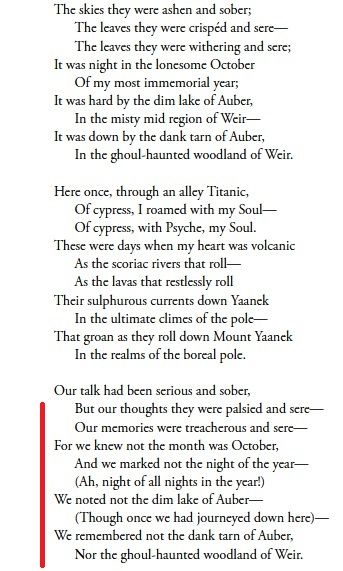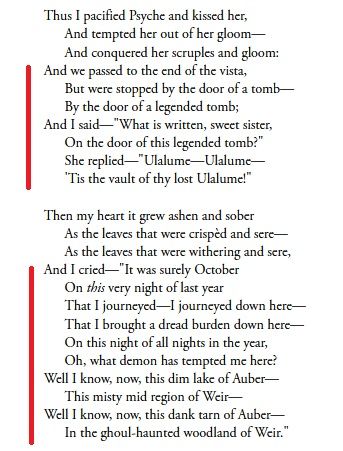Ulalume: A Ballad is one of Edgar Allan Poe’s most remarkable poems. Not only does it tell a tragic horror story in verse form, but it accurately portrays the symptoms of a specific type of amnesia. In 1847 at age 32, Poe realistically presented a fictional account of what is known today as a dissociative fugue state. He accomplished this a century before Freud and years before the first “alienists” or psychiatrists began formalizing the treatment of mental health as a medical specialty. Poe himself lacked any relevant training and relied only upon his imagination and perhaps his own experiences. The improbable name, Ulalume, derives from the Latin term, ululare, which means “wailing.”
The poem sets the weird and horrific mood in the first stanza. In the second stanza, Poe lets us know that the narrator is greatly disturbed and perhaps unreliable in what he says and observes. And then in the third verse, Poe reveals the main character’s dissociative fugue (note the wording indicated in red):

Edgar Allan Poe / Public Domain
Poe describes a man who doesn’t recognize his surroundings and seemingly isn’t aware of why he traveled there. The narrator doesn’t even know what month it is or that this date holds profound personal significance. These are exactly the symptoms that indicate a fugue state.
A dissociative fugue can occur as a feature of either dissociative amnesia or dissociative identity disorder (“DID,” formerly called multiple personality disorder). The narrator addresses his own consciousness, Psyche, as if it were a distinct person. Could this indicate DID? That’s not likely, because DID personalities usually aren’t aware of each other and don’t manifest simultaneously or converse with each other. In Ulalume, Psyche is merely a literary device. But the narrator does manifest dissociative amnesia. He has forgotten key autobiographical details, such as the date that his beloved Ulalume died and that she is interred in these very woods. A fugue state accompanies this type of amnesia when the person wanders aimlessly and without any awareness of how or why.
Dissociative amnesia and fugue are defense mechanisms against exceptionally traumatic events. Symptoms can last hours, weeks, or months. Therapy is usually necessary for the full recovery of memories. In Ulalume, the narrator has repressed memories of his loved one’s death to the point that he has suffered a psychotic break.
Near the end of the poem, the narrator encounters a tomb which triggers his return to full awareness:

Edgar Allan Poe / Public Domain
It’s possible but unlikely that a single reminder could instantaneously restore full recollection. But it is quite possible that a startling encounter could bring back partial recollection. Poe’s spooky, imaginative (and yet accurate) description of dissociative amnesia and fugue is as impressive as his lyrical style and gothic storytelling. This Halloween, I recommend reading the full poem for best effect.
© Dale Hartley. Connect with me on social media.




















+ There are no comments
Add yours